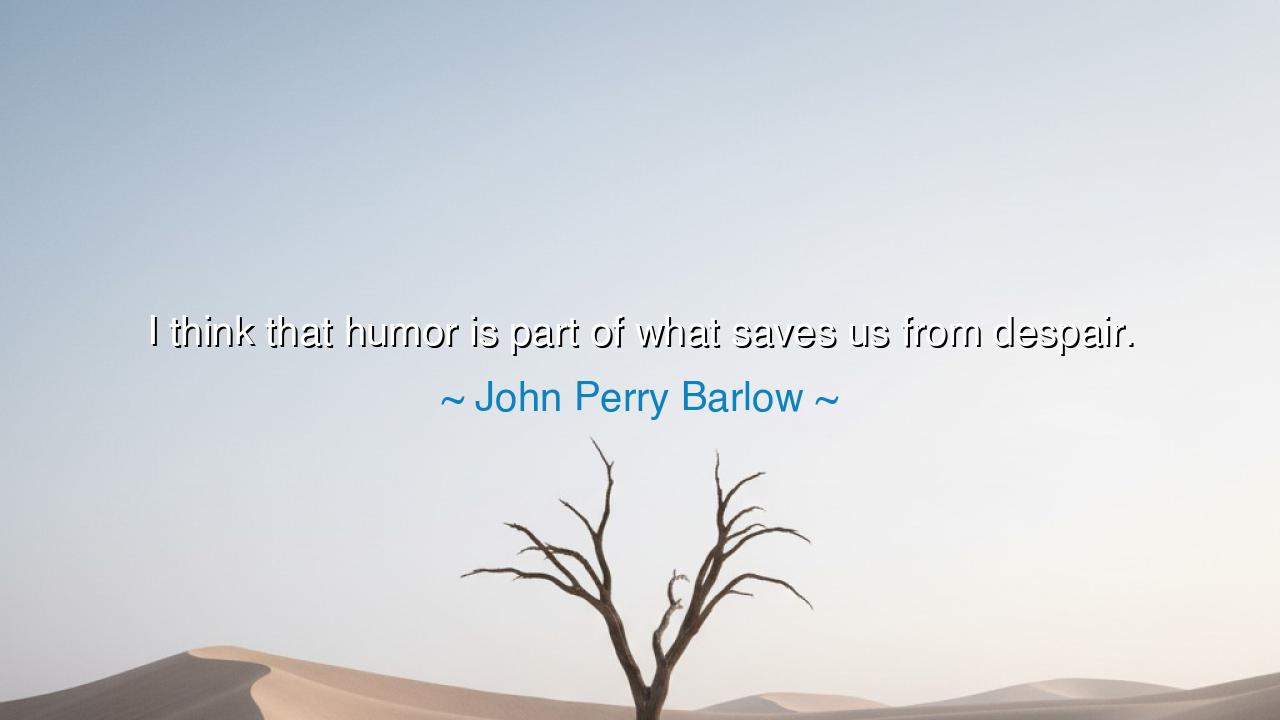
I think that humor is part of what saves us from despair.






When John Perry Barlow said, “I think that humor is part of what saves us from despair,” he spoke not as a jester, but as a sage. Within this simple line lies a truth that echoes through the ages: that humor is the lamp that keeps the darkness of the soul at bay. In those few words, Barlow gives voice to one of the oldest defenses of the human spirit—that laughter, even in suffering, is not denial, but defiance. He reminds us that in the face of chaos, cruelty, or grief, the ability to laugh is a declaration that the light still burns within us. It is the soul’s quiet rebellion against the forces that would crush it.
The origin of this wisdom comes from a man who walked between worlds. John Perry Barlow, lyricist for the Grateful Dead and a founding figure of the early digital revolution, lived at the crossroads of creativity, philosophy, and idealism. He was a man who believed in freedom—not only political freedom, but the liberation of thought, imagination, and joy. He had seen despair in many forms: in politics, in personal loss, in the cynicism that creeps into the hearts of those who dream too long. Yet, through it all, he held fast to humor. His laughter was not shallow; it was philosophical. He knew that humor is the final refuge of the human soul—the last fire that cannot be extinguished, even when everything else has fallen to ashes.
To say that humor saves us from despair is to say that it restores balance to the spirit. Despair is the weight of meaninglessness—it crushes because it convinces us that all is lost. But laughter, even bitter laughter, cracks the stone of hopelessness. It lets air and light enter where suffocation once reigned. When we laugh, we remember that life, though cruel, is still absurd—and that absurdity itself is grace. For if we can laugh, we have not been conquered. Humor, in its purest form, is resilience transformed into joy. It takes pain and turns it into something bearable, even beautiful.
Consider the story of Viktor Frankl, the Austrian psychiatrist who endured the horrors of the Nazi concentration camps. In his book Man’s Search for Meaning, Frankl wrote of how even in the darkest days of captivity, a shared moment of humor—a small joke, a wry smile—became a lifeline. “Humor,” he said, “was another of the soul’s weapons in the fight for self-preservation.” Amid starvation, humiliation, and despair, laughter was rebellion; it was proof that the guards could not own the spirit. Like Barlow, Frankl knew that humor does not erase suffering—it sanctifies endurance. It turns pain into perspective, horror into something survivable.
Throughout history, humor has been the companion of courage. In ancient Greece, Diogenes, the Cynic philosopher, mocked the vanity of kings with jokes so sharp they cut through pretense. During the Second World War, soldiers traded jokes in the trenches, finding brief relief from the madness of battle. Even in the darkest nights of oppression, jesters, writers, and comedians have used laughter to speak truth where speech was forbidden. The tyrant may silence the word, but not the smile. Barlow’s wisdom belongs to that lineage: the belief that laughter, far from being frivolous, is one of humanity’s purest acts of freedom.
In our own age, where despair often takes new forms—loneliness, division, the quiet fatigue of endless struggle—Barlow’s insight becomes even more vital. To laugh is to reclaim one’s soul from fear. Humor reconnects us to humanity, both our own and others’. When we laugh together, we remember that we are not alone in absurdity. It dissolves pride, anger, and despair in a single shared breath of joy. It reminds us that no matter how dire our circumstances, the human heart retains its mischief, its playfulness, its divine spark.
Therefore, my children of the modern age, learn to cherish your laughter—not the hollow laughter of mockery, but the deep laughter born of wisdom. When life grows heavy, find the courage to see its ridiculousness. When despair whispers that there is no point, answer it with a smile. Tell a story, make a jest, share a moment of absurd joy. You will find that in doing so, you breathe light into darkness, and hope into fear. For humor is not an escape—it is the alchemy of the spirit, turning sorrow into strength and tears into resilience.
So remember the teaching of John Perry Barlow: “Humor is part of what saves us from despair.” Let it save you—not by erasing your pain, but by transforming it. Laugh, not because life is easy, but because it is hard and you are still here. Laugh in the face of the void, and it will shrink before your courage. For laughter is not weakness—it is victory, the eternal proof that though despair may surround us, it will never define us.






AAdministratorAdministrator
Welcome, honored guests. Please leave a comment, we will respond soon